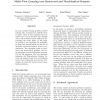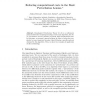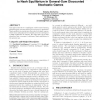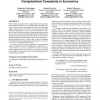417 search results - page 13 / 84 » Some Theory for Generalized Boosting Algorithms |
UAI
2008
13 years 9 months ago
2008
In many machine learning problems, labeled training data is limited but unlabeled data is ample. Some of these problems have instances that can be factored into multiple views, ea...
CASC
2006
Springer
13 years 11 months ago
2006
Springer
Homological Perturbation Theory [11, 13] is a well-known general method for computing homology, but its main algorithm, the Basic Perturbation Lemma, presents, in general, high com...
ATAL
2009
Springer
14 years 2 months ago
2009
Springer
This paper introduces a multiagent reinforcement learning algorithm that converges with a given accuracy to stationary Nash equilibria in general-sum discounted stochastic games. ...
SIGECOM
2011
ACM
12 years 10 months ago
2011
ACM
Recent results in complexity theory suggest that various economic theories require agents to solve computationally intractable problems. However, such results assume the agents ar...
INFOCOM
2010
IEEE
13 years 6 months ago
2010
IEEE
—Efficient operation of wireless networks and switches requires using simple (and in some cases distributed) scheduling algorithms. In general, simple greedy algorithms (known a...




